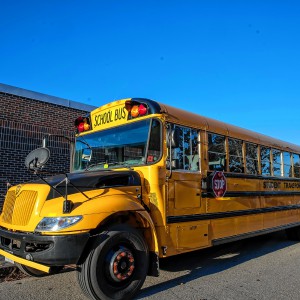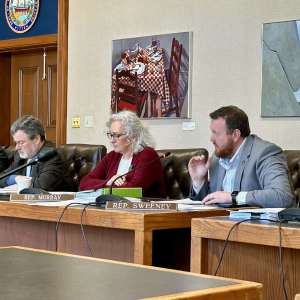What happens when your child’s school lunch balance goes negative?

Fresh chef salads are prepared in the Concord High School kitchen. GEOFF FORESTER/Monitor staff
| Published: 10-04-2024 2:29 PM |
When Michelle Beauregard’s son has no money in his lunch account, he doesn’t eat.
The Concord High School junior could, to be clear, purchase the cafeteria’s hot lunch option. But Beauregard’s middle child is a loyal pizza eater, and pizza is an à la carte option. In Concord, as in most school districts, students can’t buy most drinks, snacks, and other “extra” options when their balances go negative – even by 30 cents as Beauregard’s did recently.
“He’s a high schooler; he needs to eat,” said Beauregard. “It’s not like they have snack time where he can go and get something. If he has no food, then he has no food, and I just don’t think that’s a good policy.”
While Beauregard, who works at Everett Arena, believes Concord should exercise more leniency in its à la carte policy, she also understands that the school district needs to put its foot down at some point.
Last year, Concord forked over $92,000 to cover lunch charges that went unpaid by the end of June. The year before, the district dished out $61,000.
This year, Concord’s school board allocated $55,000 to cover unpaid lunch debt, the highest total it has preemptively set aside since a pandemic-era freeze on school lunch charges ended in 2022. If recent years are any indication, the final total could be far higher.
The mounting costs underscore the challenges school districts face surrounding school lunch payments. By law, schools must feed students a basic hot lunch, but districts have limited options to recoup the charges when families don’t – or can’t – pay.
The issue has drawn attention across the state in recent weeks after InDepthNH reported that the Goffstown School District had taken four families to small claims court over unpaid lunch debts. (Those cases have all since been dropped.)
Article continues after...
Yesterday's Most Read Articles
 House committee defunds relief program for mothers and children, spares SNAP incentives
House committee defunds relief program for mothers and children, spares SNAP incentives
 No high-speed E-ZPass at Hooksett tolls for at least two months
No high-speed E-ZPass at Hooksett tolls for at least two months
 New Hampshire law enforcement to step up traffic enforcement on Route 106
New Hampshire law enforcement to step up traffic enforcement on Route 106
 Schools in Lakes Region explore creating a special education school to bring down costs
Schools in Lakes Region explore creating a special education school to bring down costs
 Work continues on new state psychiatric hospital in Concord
Work continues on new state psychiatric hospital in Concord
 House committee reverses vote, adopts prohibition on DEI activities and spending
House committee reverses vote, adopts prohibition on DEI activities and spending
While some school districts’ policies grant administrators the authority to pursue legal action against families as a last resort, a review of court records shows that Goffstown is the only one in the area that has pursued that route in recent years.
“To do that and to embarrass the family is just – that’s not what the board wants – that’s not their goal,” said Concord Superintendent Kathleeen Murphy. “Their goal is to make sure that youngsters are fed and that they can continue to balance the budget.”
Though Concord’s current policy allows the district to “begin small claims court proceedings,” it is in the process of drafting a new policy that removes that language.
Interviews with administrators and a review of area schools’ written policies show that districts instead tend to rely on a series of escalating notifications to families when their child’s cash balance approaches and then drops below zero.
“We’re trying all the other ways – face-to-face meetings, letters from me, reminders from our food service – in order to get” outstanding debt paid, said Murphy.
In Concord, the current policy states that a first notice goes out when a student has $15 remaining in their account. Subsequent notices follow when the balance hits $0, -$10, and -$15. In Franklin, which has one of the highest free and reduced lunch qualifying rates in the state, notices begin at $10 remaining and follow at $0 and -$10. The policy gives the food services director the power to arrange payment plans for families who are struggling.
Administrators are also doing everything they can to ensure any family who qualifies for free and reduced lunch applies, though they sometimes face resistance, whether from a sense of pride, a perceived stigma or just misunderstanding.
“There are times where families don’t necessarily want to be put on what they feel is being the radar of applying for something like that,” said Jefferson Braman, the business administrator of the Franklin School District.
Meanwhile, some families who would eagerly accept support don’t qualify, because the federal income thresholds do not take into account varied costs of living by state. This school year, a family of four must earn below $57,720 to qualify for a reduced-price lunch, or below $40,560 for free lunch.
Beauregard pays the full price for her two school-age children and estimates that she spends a total of $100 per month.
“It definitely was a burden that I didn’t really want to pay, but I’m fortunate we can afford it,” she said.
Beauregard is one of a chorus of parents, school leaders, and legislators who argue school lunch should be free for everyone. The Concord school board has also advocated for New Hampshire to adopt a statewide school meal program similar to those implemented in Vermont, Maine, and Massachusetts in recent years.
“It would definitely be beneficial for any district to have a program like that in place,” said Braman. “It’s very important for kids to be able to have consistent meals.”
Research has shown that the quality of school lunches is associated with learning outcomes. Those who advocate for universal free meals see feeding children as an integral part of education, not an added bill that parents should have to pay.
Not everyone agrees a statewide school lunch program would be the right move.
“People are going to want it to be paid for, but then they’re going to get upset when our taxes go up even more,” said Felicia Rockwell, the mother of a kindergartner at Beaver Meadow School in Concord. “There was no upfront fee that I had to pay for my son to go to kindergarten, … so I shouldn’t really feel as though they’re obligated to give him free food.”
Rockwell was also troubled to hear Concord spent nearly $100,000 to settle unpaid lunch debt last year.
“I don’t think it’s fair that I have to pay more when I’m already kind of struggling even though I’m working,” said Rockwell, who is an early childhood educator at the Boys & Girls Club in Concord. “It’s not fair that I have to pay more in taxes or whatever the case is just because other people cannot afford to pay their debts.”
Fairness aside, she’s sympathetic to the larger issue.
“Children shouldn’t go hungry no matter what grade they’re in,” she said.
Rockwell has encouraged her son to share food with others if they don’t have their own. She also believes the district should focus more on getting donations to offset debt.
Both the Concord and Franklin school districts do accept financial support for their meal programs, but donations don’t cover all debt.
Murphy said her district’s approach balances the legal and moral imperatives of keeping students fed with the realities of balancing the budget.
“We feed kids,” she said. “It may not be the hamburger and french fries that they wanted, but it’s a meal that they can eat.”
Jeremy Margolis can be contacted at jmargolis@cmonitor.com.







 Henniker ponders what is a ‘need’ and what is a ‘want’
Henniker ponders what is a ‘need’ and what is a ‘want’ Boscawen residents vote to fund major renovation of public works building
Boscawen residents vote to fund major renovation of public works building ‘Voting our wallets’: Loudon residents vote overwhelmingly against $1.7M bond for new fire truck
‘Voting our wallets’: Loudon residents vote overwhelmingly against $1.7M bond for new fire truck In Pembroke, Education Freedom Accounts draw debate, voters pass budget
In Pembroke, Education Freedom Accounts draw debate, voters pass budget
